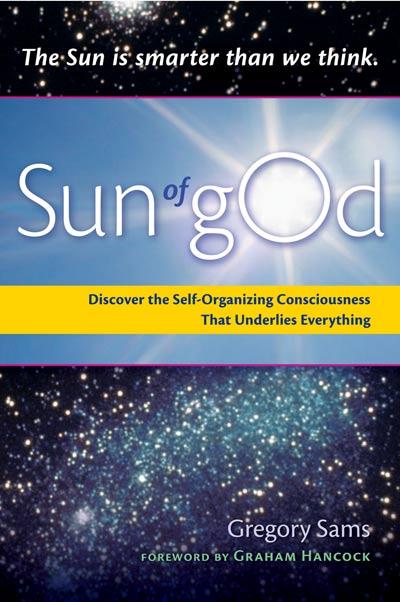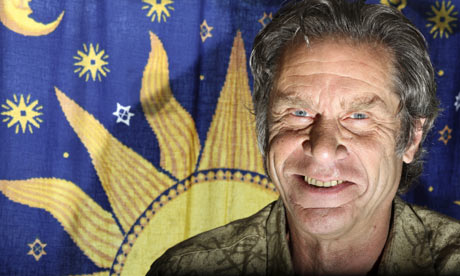
“Do not believe in anything simply because you have heard it. Do not believe in anything simply because it is spoken and rumoured by many. Do not believe in anything simply because it is found written in your religious books. Do not believe in anything merely on the authority of your teachers and elders. Do not believe in traditions because they have been handed down for many generations. But after observation and analysis, when you find that anything agrees with reason and is conducive to the good and benefit of one and all, then accept it and live up to it.”
Buddha
One of the many delights of Gregory Sams‘ book, The Sun of gOd, are the quotes, of which the above is just one sample.
I would suggest you keep it in mind while reading this review. The fact that Greg quotes it at the beginning shows that he intends that you keep it in mind while reading his book too.
Greg has assembled a large variety of sayings and quotes and references from all over the globe, from literature and mythology and gospel and scripture, either about the Sun, in praise of the Sun, or resonant with the idea that the Sun is a conscious being.
One in particular struck me early on.
It was this, from Sitting Bull, Sioux chief. He said: “Behold my friends, the spring is come; the Earth has gladly received the embraces of the Sun, and we shall soon see the results of their love!”
This is indeed a truth. A poetic truth, but a truth nonetheless. Isn’t the relationship between Sun and Earth much like that of lovers? The Earth does indeed seem to delight in the warm embrace of the Sun. The Sun does, indeed, seem to impregnate her with his fire. The Earth does, indeed, give birth in the springtime, when the blossoms come to life and all the creatures are born onto the Earth. It is, indeed, to all intents and purposes, a relationship of love.
The problem with modern scientific language is that, while it can be said to be “accurate” it does not always tell the truth. In particular it does not come anywhere near understanding or explaining the meaning of relationship. If I were to describe the act of love-making in scientific terms I would be describing a physical act – as Sigmund Freud did copiously and with an almost pornographic relish in his Three Essays on the Theory of Sexuality – but I would get nowhere near describing the essence, the meaning of the act, still less the feeling that accompanies it.
In the case of human love we take it for granted that there is more to it than the mere physical act. This is because, as human beings, conscious of ourselves, we ascribe and allow consciousness to other human beings. So we allow that love-making is more than a mere physical act. This is clear from the terminology we use. We call it “love-making” rather than “baby-making” because we are aware that love is a major component in the act.
When we talk about the rest of the Universe, however, we do not ascribe consciousness to it on any level. Our modern philosophical standpoint is that the Universe is a great big, accidental dead thing that just happens to have thrown up this anomalous spark of consciousness that is the human race.
How vain!
What struck me about Sitting Bull’s description of the relationship between the Sun and the Earth at springtime is that it is no less true to the facts than any scientific explanation, but a great deal more true to the meaning.
It does, indeed, describe exactly how the Sun and the Earth behave in relation to each other, but it adds another component too: the notion of the Sun and the Earth as conscious beings. Beings who might know love.
This is the odd and startling basis of Greg Sams’ book, The Sun of gOd.
Well I say “odd” and “startling”, but for the vast majority of our time on this planet, this concept has not been in the slightest bit strange. In fact, the idea to which we now subscribe – that the Earth and the Sun and the Universe and everything within it are just accidental lumps of matter bumping around like Dodgems Cars without drivers, which have somehow “accidentally” given rise to the one and only beings, us, who do carry consciousness – this is the new idea on this planet. And if we look at this new idea, and see where it has got us in relationship to our planet and to the living things around us in the last couple of hundred years, I think we can see that it wasn’t such a good idea after all.
Look at our world now. Look at the pollution, the destruction, the devaluation of all life – including human life – and the elevation of an abstract concept – money – into something that controls every aspect of our lives.
So what is “odd”? What is “strange”?
Certainly not Greg’s book.
Whenever I mention it to anyone, or attempt to describe it, the reaction is the same. At best it is considered eccentric. At worst, completely insane. It takes reading the book to discover that it is anything but eccentric; and, from the perspective of this book and the ideas which it puts forward, it is our modern philosophical standpoint which is insane.

I have to admit that I was already half-open to this idea before I heard about Greg’s book. I guess anyone who has ever taken part in the psychedelic experiment must be open to such thoughts. At the very least you are aware that something is going on; something for which the normal explanations seem inadequate.
This vague feeling became crystallised for me during the transit of Venus on June 8th 2004. I don’t know what it was like on the rest of the planet, but in the South Eastern corner of England. where I live, it was burningly hot that day. Fearsomely hot. I could feel the heat on the back of my neck as I went out of the door. It was as if the transit was acting as a lens and focussing the Sun’s rays onto the Earth with more intensity than usual.
I wanted to look up at the Sun to see the transit, but knew that it would blind me.
Later my upstairs neighbour set up a binocular lens and a white card through our hall window so we could observe the transit more closely. That’s when I saw it: that tiny little black dot passing before the face of the Sun.
How insignificant it appeared in the face of the Solar disc; and how huge, how magnificent, how awe-inspiringly vast seemed the Great Sun in comparison.
Venus is not much smaller than the Earth, and yet, here it was, a mere speck, a mere mote in the eye of the Sun.
How much smaller are we then, who scuttle about on our own, insignificant little planet, all 7.7 billion of us, all thinking we amount to something?
And yet, paradoxically, we do. We do amount to something, being, as we are, carriers of intelligence, of consciousness. The question then is: where does this consciousness come from?
It has always struck me as slightly absurd to think that these magnificent brains of ours, so unbelievably complex, so deeply layered and unfathomable, these quantum computers, are mere accidental generators of consciousness. What for, exactly? Is the Universe really so irrational that is would create consciousness as a by-product of matter and then leave it isolated inside our skulls, never to escape; to die and to disappear with the death of the body? That seems to me to be a fairy tale with as much basis in reality as Hansel and Gretel or the Book of Genesis.
Which is to say that, like Hansel and Gretel and the Book of Genesis (both of which I admire greatly) it contains part of a truth, is a searching for the truth, but there is much, much more.
Why do we always seem to want to look at things from one direction? If these brains of ours are consciousness generators, who is to say that they are not also consciousness receivers?
And if they are consciousness-receivers, where do they receive their consciousness from?
For me the answer to that question came beaming down to me from heaven above on the day of the first transit of Venus. It came down in the form of fierce heat and life-giving radiation. It came to me in the form of light. I was “enlightened” as it were. I could feel the Sun’s rays quickening me into life, embracing my body through the atmosphere, sending chemical surges through my brain. I could hear my thoughts stirring in some far-off, hidden womb. Thoughts that arose in my brain, and which I then listened to. Some of them were definitely not my thoughts. They were too interesting to be my thoughts. If I listened carefully enough I could almost hear something new.
So that was my answer: we receive our consciousness from the Sun.
The Sun is God, I thought.
How could we ever have imagined anything else?
Greg Sams’ book is a fascinating, deeply-informed, convincing exploration of this idea: that the Sun has consciousness. It is a magnificent romp through a Universe of ideas accompanied by a wise, witty, intelligent companion. Greg manages to make more than sense of this stupendous thought. He makes it believable.
He weaves the concept into a magic-carpet of thoughts and ideas and history and science on which we then travel, across the Universe and back again. From the Big Bang to the Creation of Life. From the stars through all the interstellar vastness of space, on a beam of light. From the Sun, our Father (which art in heaven), to the Earth, our Mother, to us, their children. And it is always a joyous ride, full of interest, full of variety, well-written, easy to understand, a book that – like all great books – should help us to change our view of the world.
I can’t recommend this book highly enough.
https://www.splicetoday.com/writing/the-son-of-the-sun-is-consciousness
Reviews of Sun of gOd
“If you ever asked, ‘What’s life all about?’ I would recommend this… A charming and mind altering book.”
Kindred Spirit 5-star review by Gavin Whyte
“Sun of gOd is wise, persuasively reasoned, and thoughtfully written – not light reading, but rich, provocative, and worth savoring, like a fine meal. By the time we finish, Sams has served up a feast… making great contributions to the global shift in consciousness.”
New Consciousness Review
“Wonderful, clear-headed, thought-provoking material….Gregory Sams’ new book, and new way of seeing, will have a part to play in the global change of consciousness that is now, as never before, so desperately needed.”
Graham Hancock, author of Fingerprints of the Gods, Supernatural, Meetings with the Ancient Teachers of Mankind
“As one who had always been convinced that nature is both intelligent and purposeful, I was both excited and moved by this remarkable book.”
Colin Wilson, The Outsider
“Gregory Sams asserts that the Sun is endowed with intelligence and consciousness. In the brilliantly articulated chapters of this remarkable book, he also provides a provocative paradigm for understanding the self-organizing capacities of the entire Universe.”
Stanley Krippner, Ph.D., co-editor, Varieties of Anomalous Experience
“A thousand snorkelstonkers for illuminating my existence with this turbo blasting whizz into the infinite and back. What a monumental rip tide of thought – truly a marvellous book. A page turner…a life enhancing, mind provoking brain tickler…..always entertaining and enlightening. Thank you Greg“
Raja Ram, TIP, Shpongle, 1200 MICS
“An unusually insightful and well-integrated exploration of the origins of religion and the evolution of consciousness, that radically refreshes our view of the world. Simply one of the wisest, most lucid, and thoughtfully written books that I’ve ever read on spirituality.”
David Jay Brown, Mavericks of the Mind, and Conversations at the Edge of the Apocalypse
“Someday, when scientists are able to directly connect with non-human consciousnesses, they may discover that the sun is indeed a conscious being and that Gregory Sams (and numerous cultures of sun worshippers) anticipated this discovery by purely philosophical means.”
Nick Herbert, author of Quantum Reality, Faster than Light, and Elemental Mind
“Gregory Sams’ Sun of gOd is one of those most rare books, an unpretentious book of wisdom. Acute, apt quotations from sages and philosophers alone justify the book. But best of all, Gregory Sams allows us to experience his pellucid perceptions and exhilarating joie de vivre. Be careful! They might be catching.”
John Allen, Chairman, Global Ecotechnics, Originator of the Biosphere 2 Project
“Sun of gOd presents a perfectly outrageous hypothesis: The sun is a conscious, living organism residing in a thriving galactic community, thinking stellar thoughts that span the entire universe. Surely this is nonsense. Except that the more you read the more a conscious universe begins to make sense. Gregory Sams’ book is a clearly written and persuasively reasoned argument to think about the sun in a radically new and refreshing way.”
Dean Radin, PhD, Senior Scientist, Institute of Noetic Sciences
